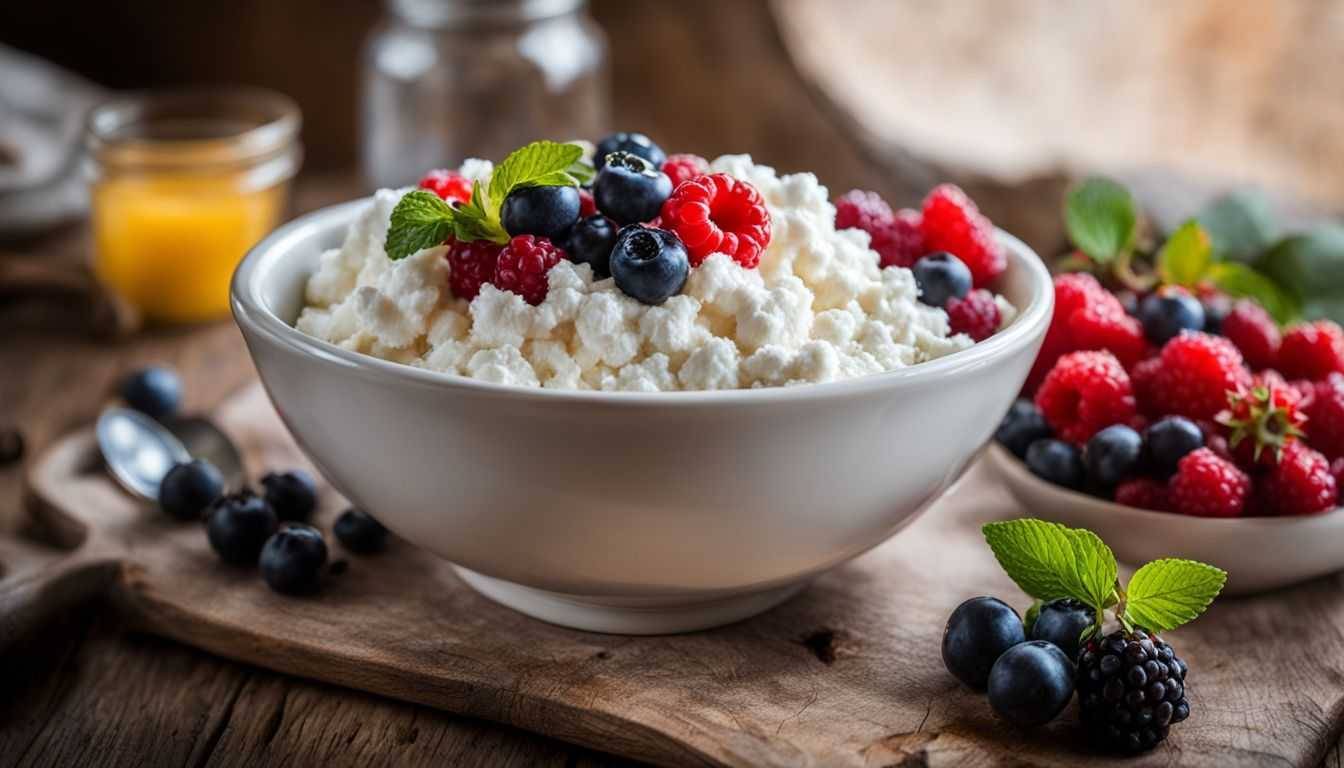When it comes to choosing healthier dairy options, many of us face a common conundrum: should we reach for cottage cheese or sour cream? Both are staples in kitchens worldwide, yet they serve very different purposes and contribute uniquely to our diets.
You might be trying to find the balance between satisfying your taste buds and keeping an eye on your health. In fact, did you know that cottage cheese has significantly fewer calories than sour cream? It’s true; when measured by weight, the difference is substantial.
This article will delve into a nutritional showdown between these two popular dairy products. We’ll compare their calorie counts, fat content, protein levels, and more – all with the aim of guiding you toward making informed choices that align with your dietary goals.
Forget about being overwhelmed by conflicting nutrition advice; we’re here to provide clear insights based on hard facts. Ready for some creamy revelations? Let’s dig in!
Key Takeaways
- Cottage cheese has fewer calories and less fat than sour cream, making it a better choice for weight loss.
- Sour cream contains more Vitamin A and Calcium but also comes with higher amounts of fat.
- You can swap sour cream with healthier options like cottage cheese or Greek yogurt in recipes to cut down on fat while keeping things tasty.
Cottage Cheese: A Low-Fat Dairy Option

Picking the right food is key for those wanting to lose weight or get healthier. Cottage cheese shines as a smart choice here. It’s made with curdled milk, but don’t let that put you off.
This soft cheese has a salty taste and comes loaded with health benefits.
A cup of 1% cottage cheese has about 164 calories – that’s not much! And it only has about 12 milligrams of cholesterol per every 100 grams you eat. What makes it even better is its protein power; half a cup can give you 14 grams of protein while keeping fat really low.
For anyone looking at their waistline or heart health, cottage cheese is a great pick over higher-fat dairy like sour cream.
Sour Cream: A Rich and Creamy Condiment

Moving from the low-fat profile of cottage cheese, sour cream stands out with its creamy texture and taste. It makes many foods like sauces, dips, and baked goods extra delicious. Sour cream gets its flavor and texture from lactic acid bacteria that thicken it up nicely.
Sour Cream is higher in calories and fat than cottage cheese. But it also has more Vitamin A RAE, Vitamin B2, and Calcium which are good for your body. If you love yogurt but want something richer, regular sour cream might be tempting because it adds a special touch to both sweet dishes like cheesecake and savory ones like Mexican cuisine.
Using reduced fat sour cream can help those who watch their weight or health. It still tastes good but has fewer calories and less fat—about 38% less! This way you can enjoy the great flavour without as much worry about saturated fat or extra pounds.
Nutritional Face-Off: Comparing Cottage Cheese vs Sour Cream

In our nutritional showdown, cottage cheese and sour cream go head-to-head as we delve into their calorie counts, fat ratios, protein levels, carbohydrate contents, and the abundance of vitamins and minerals they offer.
Discover which dairy delight aligns best with a nutritious diet plan by exploring the detailed comparison ahead.
Calories and Fat Content
Calories and fat are crucial factors for anyone focused on weight management or maintaining a balanced diet. Understanding the caloric and fat content of dairy products like cottage cheese and sour cream is essential in making informed dietary choices.
| Cottage Cheese (Low-fat, 1/2 cup) | Sour Cream (Regular, 1/2 cup) | |
|---|---|---|
| Calories | 81 | 110 |
| Total Fat (g) | 1 | 5.8 |
| Saturated Fat (g) | 0.7 | 3 |
The table clearly illustrates that low-fat cottage cheese is lower in both calories and total fat compared to sour cream. This makes it a preferable option for those aiming to reduce their caloric intake. Furthermore, the significantly lower levels of saturated fat in cottage cheese align with the dietary needs of individuals who are managing their cholesterol levels.
Shifting focus to protein and carbohydrates, let’s examine how these two dairy choices compare in the broader nutritional landscape.
Protein and Carbohydrates
Protein and carbohydrates are crucial macronutrients, essential for those managing body weight and seeking better health. Let’s delve into how cottage cheese and sour cream compare in these categories.
| Nutrient | Cottage Cheese (per 100g) | Sour Cream (per 100g) |
|---|---|---|
| Protein | 11.12g | 0.7g |
| Carbohydrates | 3.38g (net carbs) | 7g (net carbs) |
Cottage cheese triumphs in protein content, boasting a substantial 11.12 grams per 100 grams. This makes it an excellent choice for those aiming to increase their protein intake, as protein is known for promoting satiety and aiding in muscle repair and growth. Sour cream, on the other hand, offers a mere 0.7 grams of protein per 100 grams, significantly less than its dairy counterpart.
Regarding carbohydrates, cottage cheese presents a lower figure with 3.38 grams of net carbs, supporting those on low-carb diets. Individuals monitoring their carbohydrate consumption will find cottage cheese a suitable option. Conversely, sour cream contains a higher amount of net carbs at 7 grams per 100 grams which may require careful consideration by those tracking their carb intake for health purposes.
Cottage cheese stands out as a protein powerhouse with a favorable carbohydrate profile, making it a strong contender for anyone looking to optimize their dietary choices.
Vitamins and Minerals
When considering dairy options like cottage cheese and sour cream, it’s essential to examine their vitamin and mineral content, especially for those looking to manage weight or improve overall health. Here’s a nutritional comparison in an easy-to-read table format:
| Nutrient | Cottage Cheese (100g) | Sour Cream (100g) |
|---|---|---|
| Calcium | 83 mg | 116 mg |
| Phosphorus | 159 mg | 135 mg |
| Selenium | 20.3 mcg | 2.4 mcg |
| Vitamin A RAE | 28 mcg | 206 mcg |
| Vitamin B2 (Riboflavin) | 0.187 mg | 0.215 mg |
| Vitamin B12 | 0.97 mcg | 0.31 mcg |
These nutrients play various roles in body function. Calcium strengthens bones; phosphorus helps repair cells and tissues. Selenium functions as an antioxidant. Vitamins A, B2, and B12 are crucial for vision, energy production, and neurological health, respectively. Both dairy products offer beneficial nutrients, yet they differ significantly in specific areas. Cottage cheese outshines sour cream in phosphorus, selenium, and vitamin B12 content, while sour cream provides more vitamin A, vitamin B2, and calcium. This information empowers you to select the dairy option best aligned with your dietary needs.
Dietary Considerations: Lactose Content and Health Impacts

Cottage cheese and sour cream both come from milk, but they have different amounts of lactose. People who can’t handle a lot of lactose might choose cottage cheese because it has less.
It’s also packed with protein and calcium which are good for strong bones and muscles.
Eating sour cream can boost your HDL cholesterol, which is the good kind. This is important for heart health. But if you eat too much sour cream, especially the full-fat kind, it could lead to more calories and fat in your diet than you want.
For those looking after their weight or health, picking reduced-fat sour cream or reaching for cottage cheese instead might be smarter choices.
Culinary Uses: Swapping and Substituting in Recipes
Talking about lactose in dairy products, you may find that swapping ingredients can be helpful for your health. Using different foods in recipes is a fun way to keep things tasty and good for you.
- Swap sour cream with cottage cheese when making dips or dressings. This cuts down on fat and adds more protein to your meal.
- Choose plain Greek yogurt instead of sour cream for a creamy texture with fewer calories. It’s thick like sour cream, but better for you.
- Mix cottage cheese into smoothies for extra protein without much fat. It makes smoothies rich and filling.
- Use mashed avocado as a substitute for sour cream on Mexican dishes. Avocados offer healthy fats and a smooth texture.
- When baking muffins or pancakes, use applesauce or ripe bananas instead of sour cream. These fruits add moisture and sweetness with less fat.
- Try blending cottage cheese until it’s smooth and use it in place of heavy cream for pasta sauces. This trick gives the sauce body while keeping it light on calories.
- For sweet treats, mix honey or fruit into cottage cheese instead of making desserts with sour cream. You’ll get natural sweetness with the benefit of less sugar and fat.
- Mix herbs into cottage cheese to spread on toast or bagels rather than using creamy spreads that have more calories.
- Top baked potatoes with cottage cheese rather than sour cream; this small change means fewer calories but still lots of flavors.
- Make salad dressings with blended cottage cheese and vinegar to replace sour cream – based dressings. This will give your salads a fresh taste with better nutrition.
Conclusion
You learned about cottage cheese vs sour cream today. Cottage cheese has less fat and calories which helps if you want to lose weight. It gives you more protein, too. Sour Cream has different vitamins but more fat.
They can both be in your recipes, but they taste different. Pick the one that fits what you need for health and cooking best!
